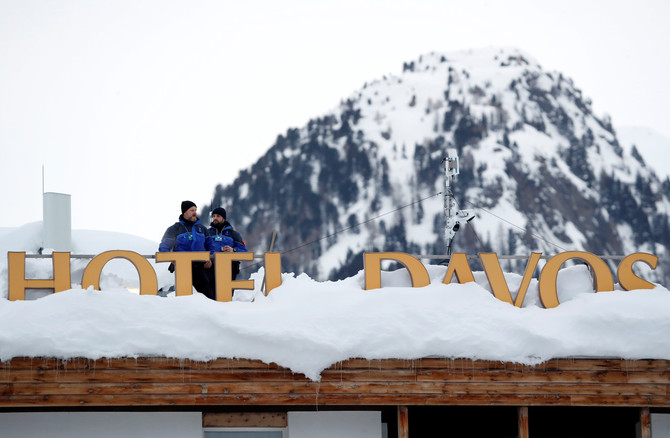DAVOS: The International Monetary Fund (IMF) has raised its growth forecast for Saudi Arabia in 2020 — although said the Kingdom’s economy will expand slower than expected this year.
In its World Economic Outlook update for January, the IMF on Monday raised its growth forecast for the Kingdom to 2.1 percent, up 0.2 percentage points from a previous projection.
However, the IMF lowered its forecast for this year to just 1.8 percent, down from the 2.4 percent it predicted in October, and is pessimistic about oil prices over the next two years.
The forecasts were part of a gloomy worldwide economic outlook unveiled amid the snowy slopes of Davos, Switzerland, ahead of the World Economic Forum’s Annual Meeting, which starts on Tuesday.
The IMF report, which warned of risk factors ranging from the US-China trade war to Brexit, was shared by Christine Lagarde, managing director of the IMF, and Gita Gopinath, economic counsellor and director of research at the fund.
The fund revised its global growth forecast for 2019 to 3.5 percent, 0.2 percentage points lower than the previous estimate. Growth for 2020 is forecast at 3.6 percent, 0.1 percentage point lower than previously forecast.
It blamed continuing trade tensions between the US and China, falling international trade and investment, and weakening business confidence for the outlook. The IMF noted that US growth was decelerating, while Chinese growth was at the lowest since 1990.
In Europe, the IMF highlighted the risks from a disorderly Brexit, as well as economic weakness in Germany and Italy.
“While this does not mean we are staring at a major downturn, it is important to take stock of the many rising risks,” said Gopinath.
Growth in the Middle East, North Africa, Afghanistan, and Pakistan region is expected to remain subdued at 2.4 percent in 2019 before recovering to about 3 percent in 2020, the report said.
Multiple factors weigh on the region’s outlook, including weak oil output growth — which offsets an expected pickup in non-oil activity — as well as tightening financial conditions in Pakistan, US sanctions against Iran, and geopolitical tensions in several countries.
The World Economic Outlook numbers are based on forecasts that oil will not rise above $60 on average over the next two years, significantly more pessimistic than the assessments of many experts and of policymakers in Saudi Arabia.
Gopinath explained that the lower 2019 forecast for Saudi Arabia reflected the decision to reduce oil output at last month’s meeting of the Organization of the Petroleum Exporting Countries. She said that while Saudi fiscal policy is more expansionary in 2019, leading to a pick-up in the non-oil sector, overall the OPEC cuts had a downward impact on the Kingdom’s economy.
The IMF’s Lagarde likened the global economy to a cross-country ski event, in which visibility, stability and cooperation between skiers had been reduced. She added that while there was not currently a risk of a recession, that policymakers had to address the potential vulnerabilities in the global economy and “be ready if a serious slowdown does materialize.”
The IMF said that its outlook “reflects a persistent decline in the growth rate of advanced economies from above-trend levels — occurring more rapidly than previously anticipated — together with a temporary decline in the growth rate for emerging market and developing economies in 2019, reflecting contractions in Argentina and Turkey, as well as the impact of trade actions on China and other Asian economies.”
Gopinath also said that there could be further risk to financial markets. “While financial markets in advanced economies appeared to be decoupled from trade tensions for much of 2018, the two have become intertwined more recently, tightening financial conditions and escalating the risks to global growth,” she wrote in a blog post.




















